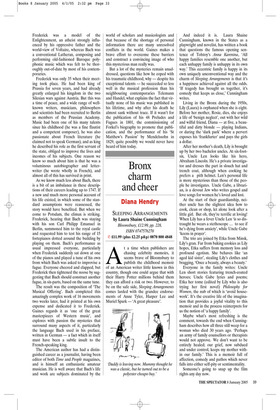Bronx charm and cheer
Diana Hendry
SLEEPING ARRANGEMENTS by Laura Shaine Cunningham Bloomsbury, £12.99, pp. 228, ISBN 0747576270 ✆ £11.99 (plus £2.25 p&p) 0870 800 4848 At a time when publishers are chasing celebrity memoirs, it seems brave of Bloomsbury to publish the childhood memoir of an American writer little known in this country, though one could argue that with their Harry Potter millions behind them they can afford a risk or two. However, to be on the safe side, Sleeping Arrangements comes larded with the grandee endorsements of Anne Tyler, Harper Lee and Muriel Spark — ‘A great pleasure’. And indeed it is. Laura Shaine Cunningham, known in the States as a playwright and novelist, has written a book that questions the famous opening sentence of Tolstoy’s Anna Karenina, ‘All happy families resemble one another, but each unhappy family is unhappy in its own way.’ This eccentric family is happy in its own uniquely unconventional way and the charm of Sleeping Arrangements is that it’s a happiness achieved against all the odds. ‘If tragedy has brought us together, it’s comedy that keeps us close,’ Cunningham writes.
Living in the Bronx during the 1950s, Lily (Laura) is orphaned when she is eight. Before her mother, Rosie, dies, she enjoys a life of ‘benign neglect’, out with her wild and wilful friend, Diana — at five, a beautiful and dirty blonde — playing Indians, or daring the ‘dark park’ where a pervert exposes his ‘frankfurter’ and pays the girls a dollar.
After her mother’s death, Lily is brought up by her two bachelor uncles. At six-footsix, Uncle Len looks like his hero, Abraham Lincoln. He’s a private investigator and dresses the part in slouch hat and trench coat, although when cooking he prefers a pith helmet. Len’s personal life is more mysterious than those of the people he investigates. Uncle Gabe, a librarian, is a devout Jew who writes gospel and love songs for women he’s loved and lost.
At the start of their guardianship, neither uncle has the slightest idea how to cook, clean or shop, let alone look after a little girl. But oh, they’re terrific at loving! When Lily has a fever Uncle Len ‘is so distraught he wears a stethoscope ... to see if he’s dying from anxiety’, while Uncle Gabe ‘keens in prayer’.
The trio are joined by Etka from Minsk, Lily’s gran. Far from baking cookies as Lily hopes, Etka suffers from memory loss and profound egotism. She behaves like ‘an aged kid sister’, stealing Lily’s clothes and bragging, ‘Once a beauty, always a beauty.’ Everyone in the family writes: Uncle Len short stories featuring trench-coated heroes; Uncle Gabe lyrics and poems; Etka her tome (edited by Lily who is also trying her first novel) Philosophy for Women, the nub of which is ‘avoid housework’. It’s the creative life of the imagination that provides a joyful vitality to this memoir and in the process reinterprets for us the notion of ‘a happy family’.
Maybe what’s most refreshing is the comment, towards the end when Cunningham describes how all three still weep for a woman who died 30 years ago. ‘Perhaps an army of family counsellors or therapists would not approve. We don’t want to be entirely healed; our grief, now subdued and under control, keeps my mother within our family.’ This is a memoir full of affection, comedy and pathos which never falls into either self-pity or sentimentality.
Someone’s going to snap up the film rights any day now.










































 Previous page
Previous page